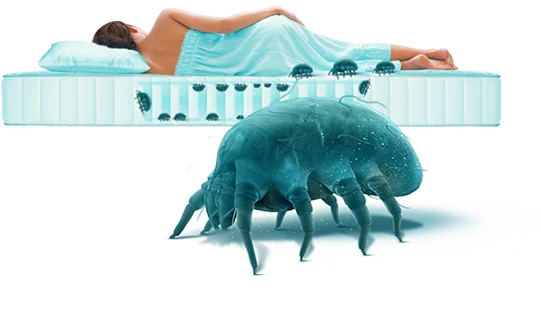
Sleeping issue or allergy?

Allergy symptoms and sleep disorders are linked
About 3/4 of people with allergies suffer from sleep disorders. It makes sense, as continuous nose blowing, sneezing, breathing difficulties and allergy attacks aren’t exactly the ingredients of a good night’s rest.
People who are sensitive to dust mites may find it hard to escape from their symptoms at night, as the offending allergens are present in the very pillows and mattresses on which they sleep. Even when allergy symptoms like rhinitis (runny nose), sneezing, sinus pain and itchy throat are not severe, they can still cause sleep interruptions that ultimately interfere with daily activities.
Despite their prevalence, sleep disorders are often underreported in people with allergies, including dust mite allergy.

The effects of fatigue are no joke
We’ve all been tired the day after a rough night. The effects are familiar: trouble concentrating at work, daytime sleepiness, lower productivity. Children with disrupted sleep patterns may be irritable, perform lower in school and have a decreased ability to learn and retain information.
But when allergic rhinitis and other symptoms caused by dust mite allergy continue over time, these effects are compounded, potentially leading to chronic insomnia, social impacts and even mood disorders. In short, chronic fatigue caused by allergy reduces overall quality of life, health and well-being.
Seek professional help
If you, your child or a family member is experiencing sleep problems and you suspect that a house dust mite allergy may be to blame, contact your family doctor, allergist or pharmacist for more insights.
Removing dust mites from your bed where you sleep for an average of 8 hours a night will relieve allergic symptoms. Eliminate dust mites from your home and make your living spaces uncomfortable places for dust mites to live is a first essential step toward treat your allergy.
Would you like to discover if you are sensitive to dust mites in the comfort of your home? Try our online allergy evaluation.

Benjamin Tillier
Benjamin Tillier has more than 18 years of international experience in various sectors. He has been active in the healthcare industry since 2011. In regular contact with dust mites allergic people as well as professors and allergy specialists, he acquired an in-depth knowledge in this field.
Related articles



